If all goes according to plan, cannabis smoke from thousands of pre-rolls will settle over President-elect Donald Trump's inaugural speech Jan. 20, 2017. Imagine the flick of thousands of lighters igniting and the simultaneous inhale of cannabis activists; it is a scene unlike any previous inauguration. The pro-cannabis group DC Cannabis Coalition (DCMJ) is passing out 4,200 pre-rolls during the morning of Jan. 20 to symbolize their goal: the full federal legalization of cannabis in all 50 states. The organization is participating in civil disobedience and participants face arrest - it is illegal to smoke cannabis in public in D.C. But, it will undoubtedly send a loud and clear message to the new president. According to the organization's website, "We legalized cannabis in Washington, DC and we are not going to let anyone take that away from us! This is an outreach opportunity to show President Trump’s supporters we are the marijuana majority."
So, what is the president-elect's stance on cannabis?
Trump's campaign platform had an unclear position on cannabis. However, he has said in the past he supports medical marijuana and state rights regarding cannabis laws. During a Feb. 12, 2016, interview with Bill O'Reilly - a conservative television commentator - Trump defended medical marijuana after O'Reilly described it as a "ruse." Trump responded with, “But I know people that have serious problems and they did that they really — it really does help them." In the past, Trump has also defended states' rights and interference from the federal government when it comes to cannabis. According to an October 2015 article by the Washington Post, Trump is quoted with, "In terms of marijuana and legalization, I think that should be a state issue, state-by-state. … Marijuana is such a big thing. I think medical should happen — right? Don’t we agree? I think so. And then I really believe we should leave it up to the states."
Even if he supports adult medical use of cannabis, his opinion on regulated adult use is hazier. He is unlikely, though, to backtrack on medical marijuana legalization in the states that have regulated adult use. There is a growing number of constituents who support legalization and a repeal would go against what many voters have supported - over half of nation's states have legalized cannabis is some form. Furthermore, waging a war on cannabis doesn't seem to be at the top of Trump's priority list - debates and interviews have instead centered on the economy and immigration.
Trump's cabinet might be a slightly different story and will undoubtedly have a role in the president's decision-making. Alabama senator Jeff Sessions, Trump's choice for Attorney General, has been most publicly anti-legalization. In the past, he has made his position clear, saying "Good people don't smoke marijuana" and vocally criticizing the Obama Administration for not aggressively enforcing federal cannabis prohibition. During Sessions' confirmation hearing on Jan. 13, he was questioned by Senators Patrick Leahy and Mike Lee on his stance regarding marijuana regulation. Many cannabis activists and patients were dissatisfied with Sessions' answers.
"...the United States Congress has made the possession of marijuana in every state and the distribution of it an illegal act,” Sessions responded to Leahy and Lee's questioning. “It’s not so much the Attorney General’s job to decide what laws to enforce. We should do our jobs and enforce laws as effectively as we are able."
Mike Liszewski, Director of Government Affairs for Americans for Safe Access, an organization supporting cannabis regulation and research, responded to Sessions' hearing with a statement. "The vague answers given by Senator Jeff Sessions during today's Attorney General confirmation hearing provided little comfort for the 2 million American patients who rely on state-run medical cannabis programs to provide them with physician-recommended medicine," Liszewski said. "With that said, Sessions still has an opportunity to set the record straight and pledge that he will respect medical cannabis patients and the state programs upon which they rely. Similarly, Congress can put the issue to rest by passing legislation to respect state medical laws."
Beyond Trump's pick for Attorney General, he has also appointed Rep. Tom Price - another anti-cannabis heavyweight - to Health and Human Services (HHS). Price could have a prominent role how accessible cannabis is across the country.
According to an article published by the Washington Post, "Although federal regulation of illicit drugs rests primarily with the Justice Department, the HHS secretary holds some powers that could restrict how available marijuana is in states that have legalized it for recreational or medicinal use. For instance, drug policy observers say that the agency could penalize doctors or sue sellers who work with medical marijuana in those states, since the substance remains illegal under federal law."
Price's record shows him repeatedly voting against measures that would prevent the Justice Department from interfering in state's marijauna laws. Because of this, he has received a "D" grade from pro-legalization groups such as the National Organization for the Reform of Marijuana Laws (NORML).
Ideally, government would reflect the desires of the country's voters. However, cannabis regulation has represented a divisive and politically-fueled, controversial topic. There are millions of Americans who have voted in favor or regulating the plant; many, including us at HMH, see it as a beneficial and natural medicine. There are also many Americans (some of which are currently serving political offices) who oppose regulation and legalization. The next four years are uncertain, but it is now more important than ever to demand accountability and fair representation from those in office. We will see if the mass smoke session organized by DCMJ will have the intended effect.













